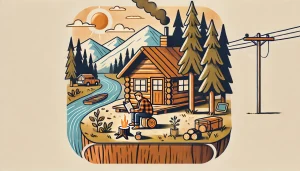Ever wondered what it truly means when someone disappears “off the grid” for weeks?
- Literally: Living without connection to public utilities (electricity, water, gas)
- Figuratively: Temporarily disconnecting from technology and social media
The phrase “off the grid” often creates confusion—does it mean complete wilderness isolation or just a digital detox weekend?

This versatile idiom appears everywhere from sustainability discussions to casual conversations about taking breaks from technology.
Understanding its true essence helps you communicate more effectively in English, whether discussing environmental choices or personal wellness strategies.
Let’s explore both the literal and figurative meanings of this phrase, its origins, and how to use it correctly in various contexts.
“Off the Grid” Explained
Literal Meaning
- Definition: Literally, “off the grid” refers to living without connecting to public utilities—namely electricity, water, or gas supplied by centralized sources. Instead, individuals or communities rely on alternative energy sources such as solar panels, wind turbines, or small-scale hydroelectric systems.
- Self-Reliance: People who adopt this lifestyle often learn skills such as farming, water purification, and constructing sustainable homes.
- Example: “That eco-friendly cabin is entirely off the grid and runs on solar power.”
Figurative Meaning
- Definition: Figuratively, “off the grid” indicates stepping away from mainstream conveniences or disconnecting from technology and social media, even if only temporarily. This figurative usage emphasizes a desire for freedom from constant online or societal pressures.
- Example: “He decided to go off the grid for a month, turning off his phone and focusing on personal projects.”
Origin & History
- Electrical Beginnings: The phrase originated from the concept of an electrical grid—an interconnected network for delivering electricity from suppliers to consumers.
- Broader Scope: Over time, “off the grid” evolved to include any form of self-sufficiency and independence, not just electricity.
- Modern Appeal: As concerns about climate change, carbon footprints, and digital overload have grown, the idiom has taken on greater resonance among people seeking alternative ways of living.
Why It Matters
Living “off the grid” captivates many because it touches on themes like self-reliance, sustainability, privacy, and personal wellness.
Even if you have no plans to adopt a fully off-grid lifestyle, being able to understand and use the idiom appropriately offers several advantages:
- Versatile Communication: It fits discussions about technology breaks (digital detox) or environmental choices (solar-powered homes).
- Cultural Insight: It highlights social trends focusing on minimalism, independence, and ecological responsibility.
- Conversation Starter: Sharing examples or anecdotes about off-grid living often sparks lively dialogue.
John Goes Off-Grid
To illustrate how “off the grid” works in practice, consider the story of John. Feeling overwhelmed by his daily grind, he chose to disconnect from technology and modern conveniences for a short period.
- Initial Goal: John wanted to reduce stress by spending a week in a remote cabin.
- Lifestyle Shift: During his stay, he used solar lanterns instead of standard electricity, relied on a rainwater catchment system for washing, and ignored all digital devices.
- Personal Growth: By the end of the week, John reported higher mental clarity, a deeper appreciation for nature, and a fresh perspective on life’s priorities.
This experience underscores the idiom’s figurative dimension. Even if one does not adopt an entirely off-grid life permanently, a temporary “off the grid” break can offer renewed energy and clarity.
Key Facts
Below are some essential points to clarify how living “off the grid” manifests, especially in countries where modern conveniences are widely accessible:
- Rising Popularity
- Growing numbers of people embrace it for environmental, financial, or personal reasons.
- Growing numbers of people embrace it for environmental, financial, or personal reasons.
- Environmental Benefits
- Off-grid setups often rely on renewable power sources, reducing carbon footprints.
- Off-grid setups often rely on renewable power sources, reducing carbon footprints.
- Self-Sufficiency
- Skills like farming, water collection, and basic carpentry become vital for day-to-day life.
- Skills like farming, water collection, and basic carpentry become vital for day-to-day life.
- Initial Challenges
- Setting up off-grid systems can be time-consuming and occasionally expensive. Many must learn new trades or purchase alternative technology, such as solar panels or wind turbines.
- Setting up off-grid systems can be time-consuming and occasionally expensive. Many must learn new trades or purchase alternative technology, such as solar panels or wind turbines.
- Long-Term Rewards
- Lower utility bills, greater freedom from energy disruptions, and a sense of accomplishment are common rewards.
- Lower utility bills, greater freedom from energy disruptions, and a sense of accomplishment are common rewards.
- Lifestyle Flexibility
- Off-grid living is not limited to rural cabins. Some city dwellers rely on urban gardens, roof-based solar systems, or shared wind turbines to reduce dependence on public utilities.
- Off-grid living is not limited to rural cabins. Some city dwellers rely on urban gardens, roof-based solar systems, or shared wind turbines to reduce dependence on public utilities.
- Financial Practicality
- While initial investments can be steep, long-term savings on power and water bills may balance the cost.
- While initial investments can be steep, long-term savings on power and water bills may balance the cost.
- Not Limited to Extremes
- Not every off-grid enthusiast lives in isolation. Many create sustainable communities with group resources.
- Not every off-grid enthusiast lives in isolation. Many create sustainable communities with group resources.
- Planning is Critical
- Weather conditions, climate, local regulations, and resource availability must be researched thoroughly.
These points highlight the blend of dedication, resources, and creativity required to succeed “off the grid.”
Everyday Examples
Sometimes, people confuse “off the grid” with extreme isolation, but there are practical ways to use this idiom in daily life. Here are several scenarios:
- Weekend Digital Detox
- “I’m going off the grid this weekend—no social media or constant texting until Monday.”
- “I’m going off the grid this weekend—no social media or constant texting until Monday.”
- Full-Time Eco Home
- “Their house is off the grid thanks to a combination of solar panels and battery storage.”
- “Their house is off the grid thanks to a combination of solar panels and battery storage.”
- Temporary Disconnect
- “He travels to remote areas and stays off the grid for a few days each month to recharge.”
- “He travels to remote areas and stays off the grid for a few days each month to recharge.”
- Lifestyle Choice
- “She dreamed of moving to a cabin far from city life and living off the grid indefinitely.”
- “She dreamed of moving to a cabin far from city life and living off the grid indefinitely.”
- Unexpected Silences
- “My colleague went off the grid during the holidays, so I couldn’t reach him for urgent work questions.”
Understanding these contexts keeps you from making assumptions that someone is in hiding or lacks basic necessities. Instead, the idiom covers a spectrum—from temporary retreats to a fully self-sustaining lifestyle.
Rephrasing “Off the Grid”
If the idiom itself proves confusing, try rephrasing it:
- Original: “He decided to live off the grid to reduce stress.”
- Alternative: “He chose to live without standard public utilities and constant connectivity to relieve stress.”
These substitutions can be especially helpful for anyone learning English. They clarify the idea behind “off the grid” when the idiom itself might not be universally understood.
Real-Life Example
One fascinating model for off-grid living is El Cabrito, a village in Spain that has relied extensively on solar power and wind turbines:
- Long-Term Project: Over a decade of building infrastructure to ensure energy independence.
- Collective Effort: Residents collaborate to maintain and improve their off-grid systems.
- Spreading Awareness: This community’s success has inspired other villages and small towns to consider similar approaches.
Similar & Opposite
To deepen your understanding, here are some related terms:
Similar Expressions
- Disconnected: Emphasizes lack of attachment to a system or network.
- Unplugged: Commonly used when turning off electronic devices to relax.
- Off the Radar: Conveys being unnoticed or not actively monitored.
Opposite Expressions
- Connected: Suggests being linked to a network, system, or public utility.
- Plugged In: Implies continuous interaction with modern resources or technology.
- On the Radar: Means being noticed or accessible.
Using these expressions can help you diversify your English vocabulary and add nuance when discussing levels of connectivity or isolation.
Pop Quiz: Check Your Idiom Skills
Off the Grid

Key Takeaways
- Definition: “Off the grid” often means living without direct access to mainstream utilities or digital infrastructure.
- Lifestyle Variation: It can describe anything from complete self-sufficiency in the wilderness to a brief technology break.
- Planning and Perseverance: Off-grid setups require careful thought, resourcefulness, and practical skills.
- Personal Growth: Some discover profound mental, emotional, or environmental benefits from stepping away from conventional systems.
- Relevance to Everyone: Understanding this idiom can deepen discussions around sustainability, self-care, and modern life challenges.
Even for those with no plans to fully transition to an off-grid existence, temporarily removing yourself from digital platforms or experimenting with renewable energy at home can be enlightening.



The phrase serves as a reminder that a more intentional, self-reliant way of living is possible—even in a world buzzing with modern connections.









Comment